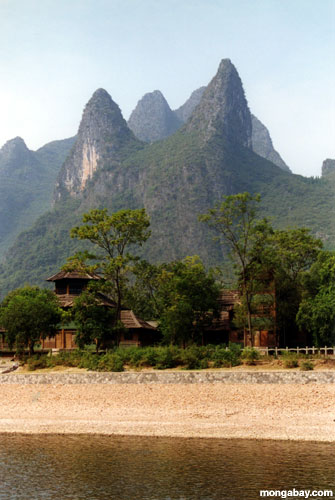|
|
|

Three Gorges Region
|
China's Environment: Will Pollution Undermine Economic Growth?
Key figures and notes from an article in The Economist Special Report on China's Environment, August 21, 2004
According to The Economist (21-Aug-04), environmental awareness is rising among members at the highest levels of China's government but political and institutional issues will make addressing its problems a long and complicated process.
Like other developing countries, China's most immediate need is to improve the living conditions for millions -- outweighing concerns over long term considerations like environmental regulations and sustainable development. Priorities of environmental activists are often not in tune with this reality. For example, "Greenpeace lobbies for China to invest in wind farms, an unrealistic answer to the country's power needs, while environmentalists from rich countries naively tell aspiring Chinese to eschew their new cars and air conditioners."
Today, China faces enormous environmental challenges including:
- Water and waste pollution
- Per capita, "China's resources are among the lowest in the world and concentrated in the south, so that the north and west experience regular droughts."
- Even where water exists, it is rarely clean due to poor treatment facilities: "around half the population, or 600m people, have water supplies that are contaminated by animal and human waste."
- China's State Environmental Protection Administration (SEPA) "found 70% of the water in fice of China's seven major rive systems was unsuitable for human contact."
- Air pollution
- China has 16 of the world's 20 most polluted cities according to World Bank figures and "estimates suggest that 300,000 people a year die prematurely from respiratory diseases."
- China has the "world's highest emissions of sulphur dioxide and a quarter of the country endures acid rain" largely due to China's reliance on coal-fired power stations for energy.
- China will soon face pollution from burgeoning car ownership -- a phenomenon that is just gathering pace -- and "hopes that China will 'leapfrog' the West with super-green cars are naive, since dirty fuel messes up clean engines and the high cost of new cars keeps old ones on the road."
- Desertification
- Dust storms in 2000 traveled as far as North America.
- Erosion
- Erosion of valuable topsoil clogs hydroelectric facilities, interferes with navigation, and ruins fishing on major rivers throughout China.
- Deforestation
- A massive reforestation campaign combined with a partial logging ban has slowed China's deforestation.
The World Bank estimates that pollution is costing China 8-12% of its $1.4 trillion GDP in direct damage. Some experts believe an economc crisis could be looming if nothing is done to address China's environmental problems. Pan Yue, deputy head of SEPA, agrees, "Our natural resources will soon be unable to support our population."
China has a long history of conflict with its environment and "for centuries the country's rulers subjugated their surroundings rather than attempting to live in harmony with them. Mao declared that man must 'conquer nature and thus attain freedom from nature.'"
Progress
Recently Bejing has changed course and moved toward better environmental regulation, boosting "environmental spending to 700 billion yuan ($85 billion) for 2001-05. However, the federal government's efforts may be stalled by the giant bureaucarcy that controls the country. As one expert from the University of Michigan puts it, "Much of the environmental energy generated at the national level dissipates as it difuses through the multi-layered state structure, producing outcomes that have little concrete effect" (Ken Lieberthal).
In order to be successful the government will need to find a way to make polluters pay. The trouble is, "a system allocating the costs to the polluter will be hard to introduce and enforce. Even in Hong Kong, the territory's environmental minister Sarah Liao concedes there is no tradition of having consumers bear the full costs of environmental regulations... Without the introduction of realistic pricing, China will not be able to afford to clean up its pollution."
China's environmental future may not be quite as bleak as projected. The government is increasing spending on the environment, while wealthier urban Chinese are putting more pressure on local authorities to clean up dirty and unhealthy conditions. International organizations and foreign governments are also adding a voice of concern over China's environment which will only strengthen as the 2008 Olympics approaches.
Copyright 2004, The Economist
CONTENT COPYRIGHT The Economist. THIS CONTENT IS INTENDED SOLELY FOR EDUCATIONAL PURPOSES.
mongabay.com users agree to the following as a condition for use of this material:
This site contains copyrighted material the use of which has not always been authorized by the copyright owner. Such material is made available in an effort to advance understanding of environmental issues. This constitutes 'fair use' of any such copyrighted material as provided for in section 107 of the US Copyright Law. In accordance with Title 17 U.S.C. Section 107, the material on this site is distributed without profit. If you wish to use copyrighted material from this site for purposes of your own that go beyond 'fair use', you must obtain permission from the copyright owner.
If you are the copyright owner and would like this content removed from mongabay.com, please contact me.
|